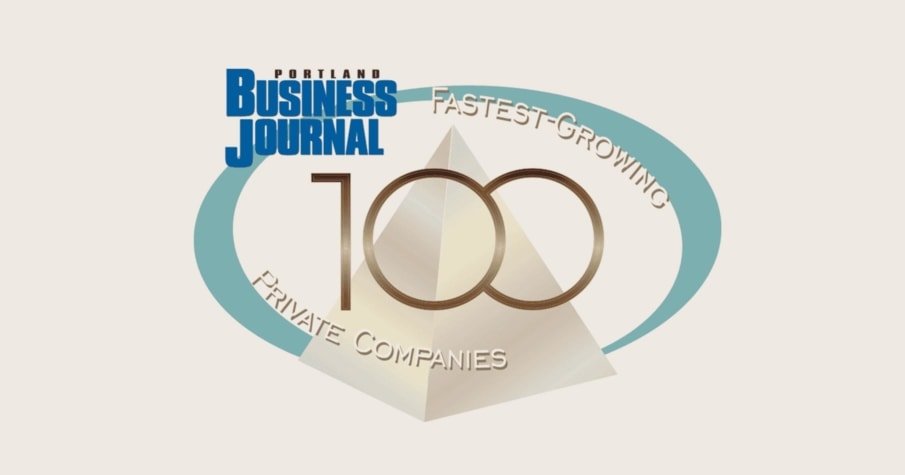
Meet Fluffy, Your 800-Pound Gorilla
Having a large customer the size of an 800-pound gorilla drives rapid revenue growth, but it also carries hidden dangers for your business.
Learn how to tame it.

Results are in – and we’ve done it again! Kinesis is thrilled to announce that we've been recognized as one of Portland Business Journal’s fastest-growing private companies of 2013!
Winning this award is no small feat, and co-founders Shawn Busse and Wendy Maynard led Kinesis to achieve it with flying colors – not once, not twice, but three years in a row.

So in light of this recent achievement, I sat down with CEO Shawn Busse, to find out just exactly how we pulled it off.
Hi Shawn, thanks for taking the opportunity to sit down with me! I know your time is valuable, so why don’t we just get to the million-dollar question: I think everybody wants to know, what’s Kinesis’ secret to success? What’s the secret sauce? What are the magic words?
In 10 words or less? Hire great people and work with great clients. Honestly, I believe that’s the true cornerstone of a successful business. Take care of hiring, and focus on working with clients that appreciate you (and for whom you can bring a lot of value). If you can accomplish that, most of your problems evaporate – and it becomes all about shared success.
The longer answer, though, is that we also own the principles we teach to our clients. That authenticity has been instrumental in our process. When we discuss the importance of creating a great culture, we aren’t just reading it out of a book – we can show what a substantial impact a great culture can make within our own office. We market to our internal customer, set goals, review KPIs vigilantly, and reward performance… so that when we preach the significance of these ideals, it’s supported by personal experience and empirical data. If you don’t practice what you preach, why should anyone else?
Kinesis was around for 10 years before making the fastest-growing list – but has made it every year since. Was there any turning point or “A ha” moment when things really started to change?
There’s a great book called Blue Ocean Strategy by Renée Mauborgne and W. Chan Kim – which exposes the pitfalls of overcrowded industries and head-to-head competition. In order to succeed in today’s increasingly competitive business world, you must meaningfully differentiate your company – thereby making competition irrelevant.
I absorbed its message right around the time of the recession in late 2009 / early 2010, which in many ways was our pivotal moment. I realized that our existing business model was not highly remarkable – while we created great work, we also had plenty of competitors producing similar work. It forced us to ask some tough questions and completely reinvent our business model.
Concurrently, the recession did us a giant favor in that it exposed how screwed up marketing was for SMBs. Businesses were struggling to survive – struggling for their very existence – and were simultaneously firing, disempowering, or cutting the budgets of their marketing people. This, of course, was completely counterintuitive – and Wendy and I realized that businesses couldn’t connect marketing to their P&L.
The recession showed us marketing was fundamentally broken, which lead to us creating our current business model to solve it. It also gave us the opportunity to examine our business operation and do a complete overhaul – establishing replicable, scalable systems and a subscription-based pricing model. I’m not sure we would’ve seen either of these shifts without the recession.
What is Kinesis’ greatest strength?
Can I have more than one? In order of importance: Tied for first, clients and employees. Without great customers none of this is possible, without great people we couldn’t have great customers.
A close second would be the processes we use. In case you haven’t noticed, I’m a big fan of borrowing good ideas – We have a stack of books in our office that provide a library of methodologies for strategic planning, change management, marketing…you name it. The cumulative knowledge of our entire team adds up to an ample collection of good ideas and practices. Kinesis’ job is to transform these ideas into processes and tools for small and medium-sized businesses.
That, in many ways, is our secret sauce – you can read a book on strategic planning, but that doesn’t make you a great strategic planner. It’s about cumulative knowledge and experience working with small businesses. Having applied those strategies, we’ve learned what works and what doesn’t. SMBs have to be nimble and able to pivot on a dime. You need processes and guiding documents that do that – while still providing accountability, metrics, and repeatability.
What is Kinesis’ greatest opportunity?
Ironically, it’s in marketing ourselves. It’s in getting the word out that there’s an alternative to traditional marketing models – one that performs substantially better, while still being financially competitive.
And what is that competitive advantage?
The ability to connect the dots between marketing and the owner’s overall vision – and then communicating it to both internal and external audiences. That means marketing from the inside out: Developing engaged employees who then interact more effectively with your customers.
That’s a tremendous differentiator from most other marketing firms: Producing new revenues is paramount, but acquiring a customer is 6-7X more expensive than selling more services to your current clients. We help our clients grow these existing customer relationships by creating an internal culture that maximizes employee engagement.
What was the biggest challenge you faced, and how have you overcome it?
When you invent a new model, people have nothing to compare it to… and that sometimes makes it difficult to communicate your offering.
The most successful strategy for tackling this has been to adopt a more conversational approach – I engage potential clients in a longer dialogue about strategic marketing. I determine whether they’re actually interested in making marketing an integral component of the company, or if they’re just looking for a tactical add-on.
Some will opt out – which is okay, because those customers are right for a different kind of business than Kinesis. But when I find the folks who are thinking strategically about a longer-term marketing partnership, that’s when we have meaningful conversations… and most of them become Kinesis clients.
What has been your proudest moment in your career with Kinesis?
Any time a client says to us: “You’ve helped our company grow,” or, “We’re different than we were a year ago.” Or even better: “We had no idea what we were getting when we started working with you.” That’s a huge moment, and however often we hear it – it never gets old.
What would you say is the most common mistake made by small business owners?
I’ve seen a lot of businesses over the years. Each one is different, but they face a set of common challenges. One of the biggest hurdles I see is leaders getting so caught up in running the business that they lose sight of their initial passion and purpose.
Without a strategic planning process and metrics for measuring success, your company will end up somewhere. But is it really where you wanted to go?
Many business owners become so absorbed in the operation, they forget why they started the company to begin with and they don’t have a longer-term plan for performance. As you grow, you have to be deliberate about maintaining that connection – both to your purpose and to your people.
So without getting too deeply into Kinesis’ specific approach, how do you solve the problem of that disconnect between leaders and their workforce?
There’s no silver bullet – we have some great processes that help people work through those challenges, but it doesn’t happen overnight. I will say that one of the great things about Kinesis is our ability to hone in on what the owner is passionate about and what they’re trying to do with their business. We help them set aside everything that has clouded their vision, and get them back to their true purpose. Our process is designed to do just that, and communicate this passion in an effective and authentic way to their employees and customers.
What advice would you give to a business looking for the same growth and success Kinesis has seen in the last three years?
I used to joke that companies who make the fastest-growing list, are a lot of the same companies to file bankruptcy three years later. Ironically, fast-paced growth can sometimes lead to the wheels coming off the bus… lapses in quality, high turnover, cash-flow shortages, you name it – there are a lot of dangers to fast growth.
Pacing yourself is just as important as growth speed. While we’ve grown quickly, it’s also been measured and strategic. We aren’t growing so fast that our employees are hurting or quality is suffering, and I’m a big believer in marathons over sprints.
That’s why the companies I admire most aren’t those who make the # 1 spot, it’s those who’ve made the list five years or longer. They know how to create sustainable growth, which is remarkable – and that list is a lot smaller. So if I were to give advice around fast growth, it would be to make sure it’s deliberate and sustainable.
What’s next for Kinesis / What are your goals for the future?
When we were suffering the blows of recession, we did an exercise called the Painted Picture – it’s a narrative description for the future state of Kinesis. The challenge now is that I think we need to repaint that picture. In many ways we’ve reached our objectives sooner than I thought we would, and the talent we’ve brought onboard is ambitious enough to take on a higher level of challenges. So, the next step for Kinesis is reframing that company vision.
Any other closing thoughts?
I would say that Wendy and I owe a debt to a lot of people; success isn’t about us. I talk about our customers and employees, of course, but there’s also a whole group of people who have helped me along the way. In many cases it’s one person who said something, shared an experience, or gave me a small piece of offhanded advice – and I thought about it, implemented it, and saw massive change in my company as a result. Many of those people probably don’t even have any idea of the effect they’ve had.
I think if I were to identify a common theme, it would be to surround yourself with people who are similar to you in approach. For me, that’s people who have a win-win mentality and a desire to live with purpose. Surround yourself with those people, and if you give to them, they’ll give back to you. That’s a pretty important idea. If you can engage in selfless giving, there’s no elevation you can’t reach.

Get insights like this straight to your inbox.